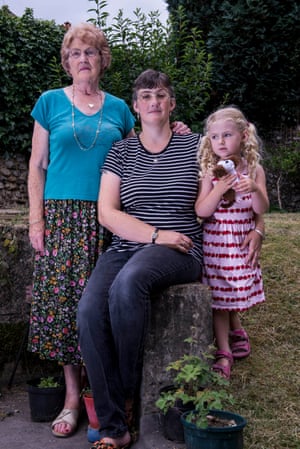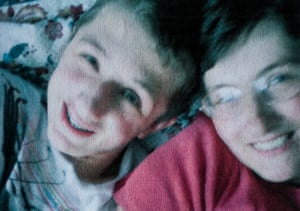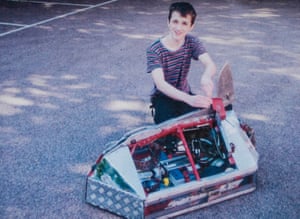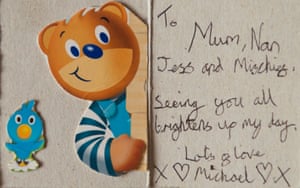On 21 May this year, Lynne Sandford contacted the Foreign Office and the police. She was worried about her 20-year-old son’s safety: Michael was a vulnerable adult, alone in America. He had been there for over a year, and his behaviour – in Skype calls home – had become increasingly erratic. Michael called every other day; after not hearing from him in a week, Lynne reported him as a missing person.
On 18 June, she was woken by a phone call at 11.30pm from the Foreign Office. She remembers every detail. They had found Michael. “I was like, ‘Brilliant – where did you find him?’ And that was the first shock. They said Las Vegas. I thought he was in New York. I said, ‘How did you find him?’ And they said he’d been arrested for trying to take a police officer’s gun in a casino. I said, ‘What was he doing in a casino?’ And they said he was at a Donald Trump rally. They said, when questioned, he had said he intended to assassinate Donald Trump. And my world just stopped.”
On 30 June, Michael Sandford was charged with disrupting an official function, and two firearm offences. He told police he had been planning to kill Trump for a year; the previous day he had been to a gun range to learn how to shoot. He was living out of his car and was in the US illegally, having outstayed his visa. A month on, he faces up to 30 years in jail and his mother is still in shock.
***
Michael was two when Lynne realised there was something different about him. His speech was delayed and his coordination was poor; he was referred to speech and physical therapists. He had a tremor in both hands – ironic, Lynne says, in light of the charges. She imitates his shaking hands. “Trying to grab a policeman’s gun? He wouldn’t have stood a chance.”

We are in the sitting room of Lynne’s flat in Dorking, Surrey. Her mother, Christine, brings tea and biscuits. The room is small and stuffed with the paraphernalia of family life. Lynne also has a four-year-old daughter, Jessica, whose favourite colour is clearly pink: there’s a pink scooter, a pink doll’s house. Michael moved out four years ago, but his toy racing cars are still on the mantelpiece. In the family photos, he looks slight and sweet and a little otherworldly. Mother and son were always close. When he was five, Michael’s father left home; Lynne raised him largely as a single parent, with a huge amount of help from Christine. Michael, Mum and Nan: they were a team.
After his wobbly start, Michael made rapid progress at primary school, outperforming most of his classmates. He was unusually knowledgable: they used to say he was like an old man in a boy’s body. And yet in other ways he was very young: he had friends – Alex and Jack were the closest, Lynne says – but he didn’t like going to their houses. His gross motor skills (running, jumping, playing sport) were poor, but his fine motor skills were exceptional. He was great at Lego, for instance, and won a number of competitions. On the mantelpiece there is a cutting from the Dorking Advertiser with a picture of a young Michael holding a matchbox. “Creative Beaver Scout Michael Sandford is celebrating a winning strike after stuffing 210 items into a matchbox,” it reads.
He liked to make fellow pupils laugh, but there were other things Lynne struggled to explain. He took everything literally, and was punishingly honest. “He’d always say, ‘Well, I don’t mean to be rude – I’m just saying it as it is.’ He had a lack of empathy.” Lynne remembers a child in his class whose father died when he was nine. She had lost her own father at a young age, and explained to Michael how the boy might be feeling. “But he shrugged and said, ‘Well, he’ll get used to it.’”
Michael went on to a comprehensive with more than 1,000 pupils, where he was lost. There were detentions for not doing his tie tightly enough, and not having his shirt tucked in. It was only later, when Michael was diagnosed with hypersensitivity, that Lynne made any sense of it: the shirt and tie had been uncomfortable. “A lot of clothing made him itchy. Bedding, too. Sometimes he’d stay up all night. I remember one time going to Gatwick Tesco, a 40-minute drive away, just to buy him cotton bedding at 3am so he’d go to sleep.”
Michael refused to sign a home-school agreement promising to do his homework and wear uniform. “He was the only person in the history of the school who refused,” Lynne says. “I thought he was being a little bugger. But he just looked at me and said, ‘Well, quite honestly, Mum, I don’t know whether I can agree to these things. So I can’t put my name to it.”

He was still showing huge promise academically, particularly at maths. His teachers encouraged him to sit a mock GCSE at the age of 12, which he passed with an A. “This is the tragedy of it,” Lynne says. “He left school with no qualifications, and he has such potential.” Michael was bullied but didn’t like to talk about it. He started to truant. One day Lynne took him back to school three times. She would see him wandering around town on a winter’s day, his hands raw with the cold. She’d bring him home; if he was going to play truant, she’d rather he was somewhere safe and warm.
Michael became anorexic and developed paralysing OCD after starting secondary school. Every other weekend, his mother or grandmother would drive him to Portsmouth to stay with his father, but he became claustrophobic and unable to cope with the car, so that stopped. He became obsessed with hygiene – either not washing or brushing his teeth for weeks, or scrubbing himself until he bled.
At the age of 13, he was diagnosed with Asperger’s syndrome, a form of autism. The specialist said it was the most severe case she had seen in 30 years: his behaviour was so ingrained it would be almost impossible to change. The diagnosis explained a lot, but it didn’t help Lynne cope. Michael stopped going to school. “He said, ‘Why would I want to learn what everybody else is learning? Because everybody is going to know it. I want to learn what interests me.’ We fought tooth and nail about it. He was offered every opportunity: home school, online tuition, private tuition, a special school.” In the end, Lynne says, he sat at home watching documentaries. “I said you’re not going to have any qualifications, and he just said well, qualifications aren’t everything. I’d explain that if you want a job, they are crucial. But he couldn’t see that.”
At 14, Michael became anorexic and was sectioned. He hired a lawyer and brought a case that he should be allowed home
I ask Christine if she thinks her daughter was too soft on him. “I’m afraid I did, at times.” Michael would stay with his grandmother two nights a week, to give Lynne a break. But even she couldn’t get him to eat. “One evening he said, ‘Sorry, Nan, I can’t eat that. Don’t cook for me any more.’ He was bloody-minded.” The two women struggled to cope. “We were trying to learn about his condition, but no one was advising us.” Lynne tried the stick approach, taking away his teenage privileges; it made no difference.
At 14, Michael won a three-day scholarship to join a police training programme. “He had always said he wanted to be in the police force, and that was the last normal thing he was able to do. After that things went downhill. He did the three days, and I think that used up the last ounce of energy he had.” Michael was put on the child protection register – not because he was at risk from an adult, but because he was a risk to himself.
He became so weak from not eating that he could barely get out of bed. Later that year Lynne reluctantly agreed to have him sectioned at the Maudsley psychiatric hospital in London. How much weight had he lost? “He refused to let the doctor weigh him,” Lynne says. But she told them he wouldn’t live much longer without treatment.
“He was like a skeleton, wasn’t he?” Christine says. “Broke my heart, seeing him like that.”
A day after being sectioned, Michael escaped. Police discovered him trying to board a train home without a ticket and took him back. Lynne shows me a letter he wrote back at the Maudsley: “Dear Mum, I’m not bad or evil or naughty and I never intend to be. I try to be polite and non-rude. At the moment I have no death wishes or wanting to self-harm. My first escape attempt was meant to be peaceful and not to harm people or damage property or break the law. Any further attempts will be the same. I do not want or intend to be violent. Unless I feel I am in danger I will be peaceful and polite. I love you very very much and I am sorry that I upset you. Lots of love, Michael.”
The next day she called to see how he was. “They said, ‘Oh, he’s fine. He’s in bed reading legal papers and he’s acquired himself a lawyer!’” Even in his darkest moments, she says, he could make her laugh. Sure enough, Michael brought a legal case that he should be allowed to return home. He lost, but made progress at the Maudsley. While he did not attend the hospital school, Michael agreed to one-to-one sessions with a teacher. The report he received on leaving said: “Michael is a very polite and articulate young man who is confident and pleasant to talk with.” After four months, now 15, he was released.
That year, Lynne was surprised to find herself pregnant with Jessica. She says Michael was fantastically mature about it. “The pregnancy was the result of a brief relationship. I didn’t think I could keep her – I didn’t think it would be fair to Michael. Then he said, ‘Mum, you have to have that baby, and I’ll do everything I can to help you.’”
But life was not easy. Michael had become abusive. “He was never violent, but he would be very verbally aggressive. He’d shout and swear at me, and then he’d be so apologetic. He’d just unleash. I spent most of my time in my bedroom. It wasn’t sustainable.”
At 16, he found himself a one-bed flat to rent a few minutes away. “It was perfect. Clean, modern, a nice outlook over the hills.” How could he afford to live independently? “He was on disability living allowance, employment and support allowance and housing benefit. He didn’t do anything, go anywhere, so he had few other expenses.”
Michael was more content than he had been in a long time. He would visit his mother every day, have something to eat and play with his baby sister, whom he adored. “But after two or three hours, you could see his anxiety levels rise and he’d need to get back.” Lynne shows me a photo album: Michael holding Jessica when she was an hour old, reading to her, helping her on the trampoline, the two of them having a picnic.
In the early days, he let Lynne and Christine come to the flat. It didn’t last; he continued his daily visits home, but barred them from visiting and withdrew into himself. Like many people with Asperger’s, Lynne says, he was a whiz with computers. She worried that he would befriend the wrong sort of people. Another passion was the TV series Robot Wars. Michael once paid £1,000 for a robot and his mother drove him, Jessica and the 16 stone robot to roadshows across the country so it could do battle.

As Lynne talks, I notice a tattoo on her upper arm, with Michael’s name and date of birth attached. What is the design? She lifts her sleeve and laughs, embarrassed. It’s a playful devil with a pitchfork. “I had it done when he was born. It was just tongue in cheek, because all parents say ‘He’s a right little …’ She trails off. “In hindsight, perhaps I shouldn’t have.”
When he was 17, Michael decided he would learn to drive. His mother was delighted and offered to book him lessons. No need, he said: he had signed up for an intensive two-week course.
“We were terrified, weren’t we?” Christine says.
“Horrified,” Lynne says. Michael had a lesson every day for a fortnight, took his test and passed. He bought a car on eBay for £500, “which is every parent’s worst nightmare. I got the RAC to check it out and they said, ‘Well, it’s not bad,’ and he said, ‘OK, I’m off out.’” Thirty seconds later, he had over-accelerated into another car and written his off.
On New Year’s Eve 2014, Michael told his mother he had news – and she wasn’t going to like it. He was going to New York. “I just collapsed on to the sofa. I said, ‘This is insane – what the hell are you on about?’” Lynne asked her GP and local mental health services how she could stop him. “They said, ‘He’s 18; there’s no way short of having him declared mentally incompetent,’ which clearly he was not.” She tried to see it from his point of view. “His old school friends were at university or having gap years, and we thought he felt left behind. It was his way of being normal – do a bit of sightseeing.”
On 18 January 2015, he left. The next day, she received a call. “All I heard was, ‘Are you Michael Sandford’s mother? This is an American hospital emergency room,’ and again everything in me just stopped. I started yelling, ‘Oh my God! Is he dead? Is he dead?’”
Michael was not hurt, but he had been found by the road in a state of extreme distress. He was forcibly given a drugs test, because the police thought he was high. In fact, he was having a meltdown, and was sectioned overnight. But the hospital discharged him the next day, and he continued his two-week trip in a rental car.
By the time Michael returned home, he was a wreck. “He just broke down and came out with this…” Lynne shudders to a stop. “I can’t say ‘tale’ or ‘story’; I’ll say ‘version of events’.”
“He was terribly, terribly distressed,” Christine says. “He said that, unbeknownst to us, between the ages of 16 and 18, he’d had a girlfriend, and got her pregnant. He said they’d had a scan and it was a boy. And the day after Michael’s 18th birthday, this girl was killed in a car crash. He said that after this he’d attempted to commit suicide twice.”
Michael told them he had a new girlfriend, who had recently moved back to America; but when he got there, a friend had texted to say she was in prison on a drugs charge.

Lynne didn’t know what to think. She still doesn’t know what to think: she has been unable to corroborate the story of the girlfriend and the fatal accident. She has no idea if any of it is true, but says Michael had no history of lying to her, and no history of psychosis. She pauses, and says there was one incident when he was eight and convinced aliens were coming to get him. “He was shaking and cowering, and we took him to hospital. It was like he was possessed.” But nothing since.
Michael told Lynne and Christine he wanted to be there for his girlfriend, Lauren, when she came out of jail. He said he would move in with Christine and save to get back to America. But he couldn’t save quickly enough; he asked his grandmother to mortgage her house.
“He plagued us for money.” Lynne’s voice is quivering. “He said, ‘I’m going to have to either commit suicide or turn to illegal measures.’ We said, ‘We love you, but we can’t do this. I’m a single mum on the minimum wage, and Nan can’t mortgage her house.’”
Lynne looks at her mother, just about holding her tears back. “If you’re OK with me saying this? Quite by chance my mum came into an inheritance. Her sister had left a reasonable sum of money, which Mum was going to split four ways: her, me, Michael and Jessica.” Christine and Lynne agreed to forfeit their shares and pay for a year’s rent for Michael in New York. It was a last resort.
They made Michael sign an unofficial document stating that the money was a one-off to help him turn his life around; that over the year he would come home regularly (he needed to sign on every 90 days for his benefits, for one thing); he would live in the flat; he would not break the law; and he would not attempt to kill himself. It was agreed that his first visit home would be in five weeks’ time, for Jessica’s third birthday.
But Michael never came. He told his mother there was a warrant out for his arrest in the UK (he had left a few utilities bills unpaid). Lynne contacted the police, who assured her there was not, but Michael said he believed his source rather than her. He lost his benefits. Lynne pleaded with him to come home for Christmas, but Michael said it wasn’t an option. He told them Lauren’s friends were now his friends. She began to worry that he had come under the influence of a cult; she also feared that he was simply ill and delusional.
Michael’s Skype calls were becoming less frequent. When he rang, his face was always blurry and against the same white background. Lynne asked him to show her around the flat, but he refused. Just before Christmas 2015, he rang home and said he’d moved into a cheaper flat. It didn’t make sense; the rent had already been paid. But he told them he’d got a refund on the outstanding time, and preferred the new flat.
On 17 April, he told them he’d been kicked out of the new flat, and needed money for a hostel. His father had been sending him £60 a month, and Lynne and Christine sent what they could. They begged him to come home. “He said, ‘I can’t – I’ve been very ill and run up lots of medical bills.’” A month later, Lynne reported him missing.

The night after Lynne was told of her son’s arrest, a friend rang. “She said, ‘I think you’d better turn the telly on.’ It was midnight and I saw pictures of him being arrested. Headlines going across the screen. I couldn’t believe it. My son, headline news for something so awful, and something just so not him. It broke my heart because it was the most I’d seen of him in a year. I just wanted to wrap my arms round him and never let him go .”
A few weeks ago, a tabloid newspaper offered to take Lynne and her ex-husband, Paul Davey, to Las Vegas, where Michael is in custody, in exchange for an interview. But Jessica did not have a passport and Lynne did not want to leave her, so Paul went alone. The newspaper promised to take Lynne as soon as Jessica’s passport came through, but then decided not to. Subsequent reports suggested Michael had a thing for guns. Lynne says this is misleading: there was a brief period when he was into airsofting (a game similar to paintball, in which participants shoot at each other with non-metallic pellets). Yes, at one point he had camouflaged his bedroom and hung replica guns on the wall, with help from his father; but three months later the room had returned to its motor-racing theme.
Paul tells me that the first time he talked to his son, via video link, at the detention centre he was unrecognisable. “Michael said, ‘Someone had to stand up for America,’ and was going on about how dangerous Trump’s policies were – building the wall, banning Muslims. He didn’t seem to know what the consequences were, what he had been charged with. He thought it would blow over and he’d be home soon. I saw him again a few days later and he was calmer, much more like his old self. We were talking about what we used to get up to. He never mentioned Trump once.” Paul has not been in touch with him since that second conversation.
Had Michael ever talked to Lynne about politics? “Not once,” she says. “Not to Mum, not to me, his father, his friends. He never had any interest.”
She and Christine talk about his despair in the weeks leading up to the Trump rally. I ask them if they think his attempt to grab the gun might have been a bid to die, while still keeping his promise that he would not commit suicide. “No,” Lynne says instantly. “I think this was his way of getting help. He was always a bit of baby on the physical side of things, so I wouldn’t think he’d choose to be shot. I also think he would have sent me a goodbye letter.”
Why Trump? Did Michael ever talk politics? ‘Not once. To Mum, me, his father, his friends. He never had any interest’
His grandmother seems less sure. “He did tell the police that he thought he’d be dead.” She mentions the most recent messages he had sent her. “One night, just before we got in touch with the police, I said, ‘Look after yourself,’ and he said, ‘I can’t.’ Then he sent me another message saying, ‘I can’t live like this much longer.’”
Did they ever suspect he might do something like this? No, she says. Apart from the verbal outbursts, he has never been violent. “I asked his friend Alex,” Lynne says, “‘You know him in a different way to me; did he ever give you any indication he could do something like he has done?’ And he said no, never. His other friend Jack went on Facebook and said, ‘I want to tell the world Michael isn’t like that.’”
For the past three weeks, Lynne has received calls every night from the detention centre in Las Vegas. All she hears is a crackling and beeping like a fax machine. She knows it is Michael. The detention centre has told her there is a technical issue with international calls.
“Then on Friday night, something incredible happened.” Her face lights up. “Eleven pm, an unknown number rang, and I just heard, ‘Hi, Mum.’ He’d been allowed to call from an office as a one-off. I spoke to him for five minutes. I asked him how he was and he said, ‘Well, not good, obviously. It’s prison.’” Did she ask him what happened? No, she says – she knew time was short. “I said, ‘Your nan loves you, your dad loves you, I love you.’”
She has been told he is on three medications: for anxiety; to help him sleep; and for hallucinations. “He’s hearing voices. He said in that call, ‘I just want to come home and get psychiatric help.’ Obviously I can’t condone what he attempted to do, but he was not in control of his mind. Yes, a sentence by all means, but a sentence over here where his family can visit him and where he can get the help he needs.” Lynne has been warned that US courts are not sympathetic to mental health problems; it is unlikely to affect his sentencing.
Lynne knows she is running on empty. Since she heard the news, she has been unable to sleep and eat properly. Fighting for her son is the only thing keeping her going; she has launched a CrowdJustice page to help with legal fees.
The trial is due to start on 22 August, though Lynne has heard that the case is more likely to be settled before that with a plea bargain. “I assume he will be asked to admit his guilt, and in return be offered a lesser sentence.” In a way, she says, she hopes it does go to trial – so a jury can see how helpless he is. But the danger is that they throw the book at him anyway.
Last week the Foreign Office told Lynne that Michael had been put on suicide watch. Does she think he is at risk of killing himself? “One hundred per cent. If he gets a lengthy sentence and he stays out there, he will commit suicide. He won’t see the point.”
On Friday, a day before this article was published, Michael managed to phone home successfully for the first time. “He was extremely distressed, and begged me to get him home,” Lynne says. “He said, ‘I can’t cope. I can’t last out much longer.’”
- This article was updated on 30 July 2016.
"They said my son intended to assassinate Donald Trump. And my world just stopped"
Hiç yorum yok:
Yorum Gönder